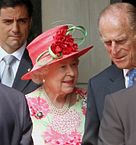Image: By dbking from Washington, DC
Elizabeth II has become legendary across the globe as a dignified but silent figure who sees all but comments little. However, according to comments in a recent minister’s memoirs she may be more involved in the running of Government than many people realise.
The Queen is a figure head. She leads the nation through her example, her conviction and her remoteness from politics. She is a towering ambassador for the UK – and her other realms and territories – and brings substantial revenue into businesses, households and the treasury coffers. But when it comes to the political operating of the country, technically running in her name, she is entirely uninvolved.
Or is she?
Recently I have been pouring through the incredibly compelling memoirs of Ken Clarke, the veteran Conservative minister who served the Heath, Thatcher, Major and Cameron administrations. It’s full of twists and turns and no pages are more exciting than those focused on the political upheaval that plagued the Major government over the European Union and the Maastricht treaty (USA and younger readers – don’t worry – you won’t need to know anything about these issues to follow the rest of the post).

According to Clarke, when Prime Minister John Major was aware that his personally negotiated treaty might not obtain a parliamentary majority he pondered resigning (this is well attested to elsewhere). However, according to a conversation that Ken had with John Patten (a fellow government minister), the Prime Minister had been spoken to Robert Fellowes, the then private secretary to the Queen who had ‘hinted’ that if Her Majesty were asked for a dissolution of Parliament – and therefore a general election – she would refuse. Apparently she had not admired the way that former PM Ted Heath had ‘taken it to the Country’ when he failed to settle an industrial dispute. She did not want a repeat performance.
For obvious reasons, this account can’t just be taken as read. It relies on John Patten having heard if accurately from either Major or someone close to him, Major having correctly understanding what Fellowes was ‘hinting’ at and Fellowes himself having rightly understood the Queen’s actual sentiments. But with those caveats in mind, the story does have a ring of credibility to it. The casual way that Clarke mentions it – almost in passing and to illustrate a bigger point – suggests that people close to power found it credible and perhaps, that such interventions from the Palace were not wholly exceptional.

Image By PFC TRACEY L. HALL-LEAHY, USA
Today, because of the ‘fixed-terms Parliament Act’, the Queen has a much reduced role in the dissolution of Parliament and the calling of General Elections. But prior to 2010 a Prime Minister would effectively determine the timetable by asking the Queen to grant a dissolution, which would in turn lead to a General Election. No Parliament was allowed to sit for more than 5 years, but if a Prime Minister thought things were going well, they generally liked to ‘go to the country’ after 4.
No doubt some will harp on about the Queen’s active involvement in so recent a political event, claiming it is undemocratic and an example of why the monarchy must go. But I see it very differently. In the situation in question, the country had only just had an election. Was anyone really in the mood for another one? More importantly, ensuring that the elected Government don’t try and use the polls as a political tactic to solve disputes that they themselves are supposed to handle is, in and of itself, a safeguarding of democracy.
Every head of state – elected or otherwise – is meant to enforce the constitution and hold the Government to account for it. Clearly in the UK’s uncodified system that can be tricky at times. I wonder if those of us fortunate enough to dwell on these isles realise how lucky we are that these judgements fall into the hands of a canny, wise and experienced stateswoman who has no agenda save her devotion to duty.
